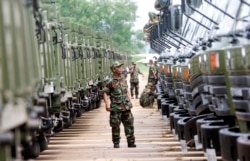An International Criminal Court investigation report reveals that Cambodia’s decision to deport 22 Uyghurs in 2009 was insufficient to exercise its jurisdiction into persecution faced by the ethnic minority in China.
A report from the court’s Office of the Prosecutor released on December 14 shows that earlier this year communication was submitted that said the court had jurisdiction over alleged Chinese persecution of the Uyghurs ethnic minority because part of the crime had been committed in a state party to the ICC.
China is not a member of the ICC, but the communication said that Uyghurs were arrested, or “abducted,” in Cambodia and Tajikistan and sent back to China, which meant that part of the crime had occurred in an ICC member state.
The prosecutor’s office said this precondition was not sufficient for the court to exercise territorial jurisdiction for a majority of the alleged crimes, such as genocide, crimes against humanity, torture, or other inhumane acts.
The office did look into the alleged acts of deportations and found that it may have deviated from local and international law.
“The Office observes that while the transfers of persons from Cambodia and Tajikistan to China appear to raise concerns with respect to their conformity with national and international law...it does not appear that such conduct would amount to the crime against humanity of deportation under article 7(1)(d) of the Statute within the jurisdiction of the Court,” reads the document.
“Accordingly, the Office determined that there was no basis to proceed at this time,” it added.
The deportations happened in December 2009, when the Cambodian government raided a shelter run by the United Nations refugee agency in Phnom Penh and detained 22 Uyghurs seeking asylum.
They were deported the next day in a chartered flight sent by the Chinese government.
Deputy Prime Minister Sar Kheng reportedly said to UN officials later that the government was then in a “difficult position due to pressure from outside forces”, according to British journalist Bill Hayton, who wrote about the incident in his 2014 book “South China Sea.”
The day after the Uyghurs were deported, then-Chinese Vice President Xi Jinping made a short visit to Cambodia with a pledge of $1.2 billion in aid to Prime Minister Hun Sen’s government.
The U.S. government responded by halting the delivery of 200 military vehicles to Cambodia, only for the Chinese government to announce another aid package for 256 military vehicles.
Interior Ministry Spokesperson Khieu Sopheak defended the decade-old action on Wednesday and denied that China pressured Cambodia to deport the Uyghurs.
“Cambodia eats in Cambodia’s house, while China eats in China’s house,” Khieu Sopheak said, using a metaphor to explain the principle of non-interference between the two countries.
He said Cambodian authorities were only “enforcing their own laws” in arresting the “undocumented” Uyghur refugees.
“And even if you are ICC officials or those [who lodged the complaints], you will be arrested if you happen to enter Cambodia illegally,” Khieu Sopheak said.
Cambodia was among 37 states joining a petition in July last year, at the United Nations’ Human Rights Council in Geneva, in support of China’s policies in Xinjiang province, where a large number of Uyghurs live.
Phil Robertson, deputy director of Human Rights Watch’s Asia division, said ICC’s refusal to investigate the deportations in Cambodia did not justify the action of sending back people seeking asylum.
“That action [deportation] showed PM Hun Sen operating in his most crude, rights-abusing way by trading refugees’ lives to China in exchange for a big payout in political and financial assistance,” Robertson said in an email.








